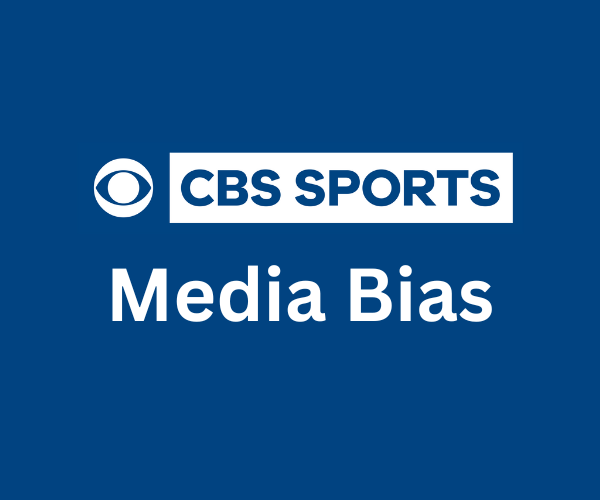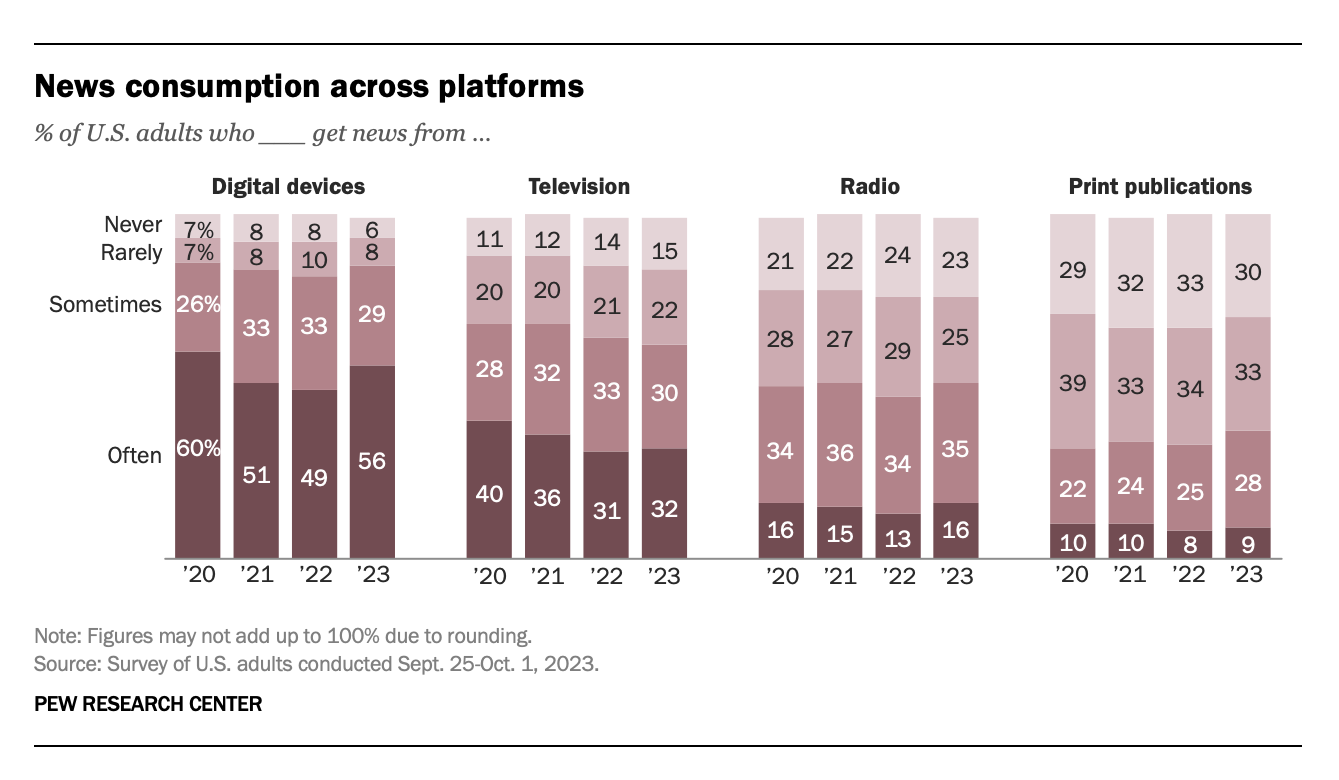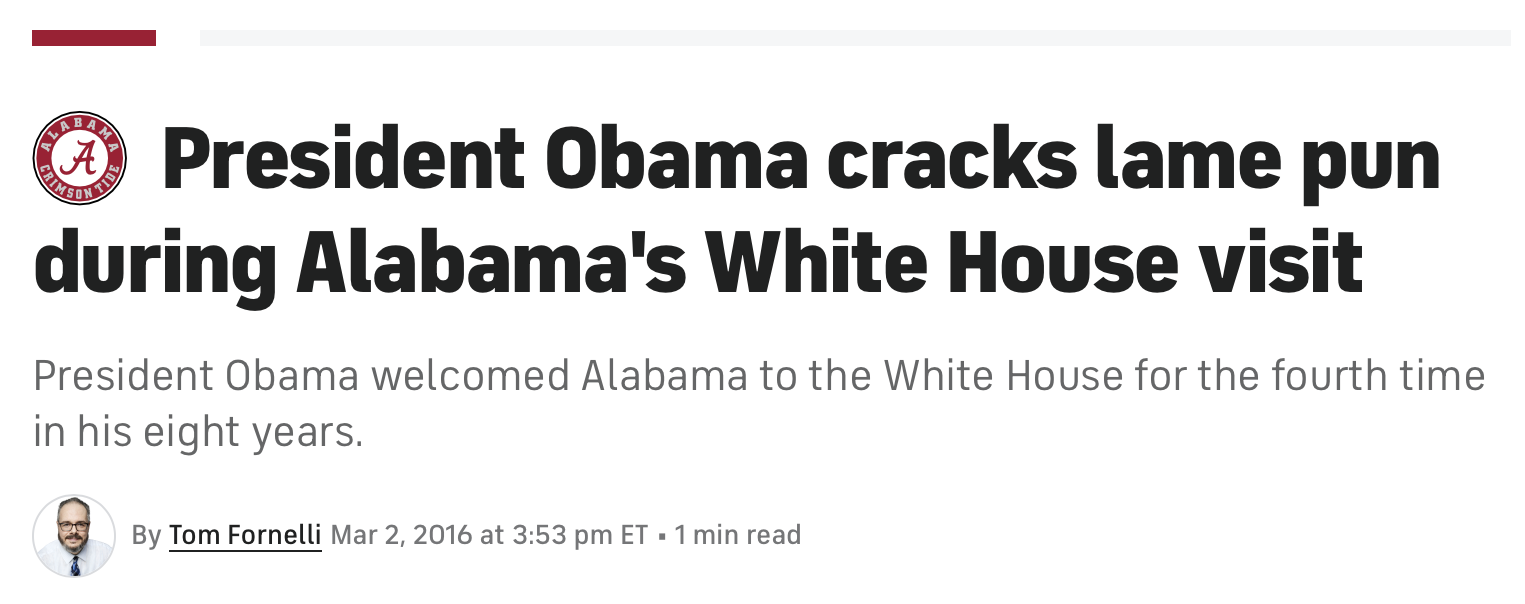
CBS Sports is a branch of CBS Broadcasting Inc, and while CBS News primarily focuses on current events and politics, CBS Sports is entirely focused on what’s in their name– sports, but may occasionally discuss political topics surrounding the sports world. According to YouGov data analytics, CBS Sports is a relatively famous network, with an 88% fame rating. That’s a higher rating than NBA TV and FS1, which is a branch of Fox Sports.

As a popular network, bias certainly comes into question when considering the overall trustworthiness of CBS Sports Network. In this article, we will analyze their coverage and analyses of certain topics and events to determine if there is any political bias in their reporting.
Through our analysis, we hope to answer the following question: despite being a network that’s primarily dedicated to covering athletes, games, and scores, does CBS Sports have any political bias? We’ll turn to Biasly for some help.
How Does Biasly Rate News Sources?
Biasly’s algorithms produce bias ratings to help provide multiple perspectives on given articles. Biasly has analyzed 200,000+ news articles from more than 3,200 news sources through our A.I. technology and team of political analysts to find the most factual, unbiased news stories.
Biasly determines the degree of political bias in news sources by using Biasly’s Bias Meter Rating, in which Biasly’s team analyzes media sources’ reliability and bias and produces three scores, a Reliability Score that measures the accuracy of media sources; an A.I. Bias Score, evaluated by A.I.; and an Analyst Bias Score evaluated by political analysts.
These scores are rated based on seven rating metrics including Tone, Tendency, Diction, Author Check, Selection/Omission, Expediency Bias, and Accuracy. These metrics help our analysts to determine the political attitude of the article.
Our A.I. machine-learning system employs natural language processing and entity-specific sentiment analysis to examine individual articles and determine their bias levels. By analyzing the key terms in an article such as policies, bias phrases, political terminologies, politicians, and their nicknames, the algorithms can rate the attitude of the text.
Bias scores range from -100% and 100%, with higher negative scores being more liberal and higher positive scores being more conservative, and 0% being neutral.
Is CBS Sports Politically Biased?
Biasly’s rating for CBS Sports is based on two scores, one from its computer algorithms which are based on Artificial Intelligence, and one from its Analysts. Biasly rated CBS Sports with a Computer Bias Score of Center and no Analyst Bias Score, which means the network can be considered fairly unbiased and politically-centered, without enough political content to gather an analyst score.
Of course, this score– like all others– deserves a closer look in order to truly understand it. Biasly’s A.I. score was Center-Left, meaning CBS Sports has the slightest of leans to the right. This lean is so minor that it’s unlikely to ever be noticeable.
In terms of the analyst bias score absence, the most probable explanation is a lack of thorough analysis, which could be due to a lack of politically-based articles. After all, CBS Sports isn’t meant to cover politics, and they do so very rarely.
Analyst scores are based on an average of at least 15 articles. Each article is reviewed by one liberal, one moderate, and one conservative analyst. The more articles rated by Bialsy’s analyst team from one source, the more accurate the analyst score is for that source. In this case, so few politically-relevant articles exist from CBS Sports, so there is no analyst score. Let’s take a deeper dive into the potential bias of this network, in lieu of an analyst score.
Before we begin, we need to discuss bias. Bias is a natural function of humans, and we can express it both consciously and unconsciously. Bias is one of the most fundamental forms of pattern recognition in humans. This isn’t to lower the bar and say that “all things are biased,” but to explain the process in which we may come to trust certain news organizations that display patterns of coverage.
On the media’s part, there is an incentive to retain audiences, encourage them to purchase subscriptions, and rate products positively. Bias is a two-way street, people want to see news stories about things they care about, and the media needs viewers to continue their operations. This creates a positive feedback loop that influences what stories are covered and from what perspective. This also explains the actions of more liberal news organizations.
Analysis of Bias in CBS Sports Online Articles
When determining bias, the metrics we use are as follows: Tone, Tendency, Author, Diction, and Expediency Bias. These are the primary metrics we’ll focus on below.
- Tone: The attitude displayed in the writing, related to the author’s word choices or diction.
- Diction: The words chosen by the author.
- Author: Relates to the article’s author, considering their history of stance on issues based on past articles and social media posts.
- Tendency: Measures how consistently an author shows bias in their work, including factors like their tone and perspective.
- Expediency Bias: Initial impressions created by concepts like the article’s headline, images, or summary, indicating if they favor a particular viewpoint.
With that being said, let’s take a look at some political articles from CBS Sports and evaluate how each one fares with these five categories. Here’s an excerpt from an article they published in 2019 called “Candid Coaches: Would Your Team Visit Donald Trump in the White House if it Won the National Title?” which discusses a disinterest shared by many college basketball coaches in visiting the Trump White House.
While this article does focus on sports, it also brings up political discussion with mention of former President Trump and the decision a team made to not visit him in the White House after winning a championship.
“Virginia coach Tony Bennett created headlines in April when he announced, just weeks after winning the national championship, that his Cavaliers would not be visiting the White House. The official explanation was that “it would be difficult, if not impossible, to get everyone back together.” But when you consider that teams in similar situations, literally for decades, managed to figure it out, well, that explanation doesn’t suffice. Plus, it should be noted that when Virginia raises its championship banner in September, every player from its championship team is expected to attend the ceremony — which suggests it’s not actually impossible to get everybody back together if everybody wants to get back together.
Simply put, the Cavaliers just didn’t want to go to the White House.
President Trump is obviously the reason.”
One of the first things that should be considered is diction– is the author, Gary Parrish, using words that indicate pro-Trump or anti-Trump bias? To a certain extent, it seems as though he’s making assumptions about Trump that present him in a negative light. Parish states that “President Trump is obviously the reason” a team skipped out on their White House invite, even though the team’s coach had already offered an explanation that suggested otherwise.
The author clearly has his own preconceived notions, and his word choice suggests some level of disdain for Trump. A similar explanation applies to his tone in this article.
“The majority of coaches we spoke with either despise the man or understand he’s despised by so many, so intensely, that visiting him would create a public perception they’d rather avoid.”
Using words like “despise” exposes a potentially negative tone from the author, considering he’s acting on his own interpretations, rather than citing an actual quote from a coach who was surveyed for this article.
Additionally, a quick Google search of Parrish reveals more about his political beliefs. His Twitter feed– AKA “X”– features some anti-Trump content, or at least content that insinuates anti-Trump bias. In terms of tendency, however, there isn’t much to be said, as he rarely covers politics in his writing.
The President of the United States just described some people who marched with neo-Nazis and white supremacists as “very fine people.” https://t.co/6llJUyPDAb
— Gary Parrish (@GaryParrishCBS) August 15, 2017
The headline of the article doesn’t appear biased, but the picture shows Trump contrasted against a dark background serving fast food, which could be designed to paint him in a negative light. This indicates that there could be some expediency bias in Parrish’s piece.

There are some miscellaneous examples of very minor biases to both the left and right within the network’s content. These instances are insignificant and tend to balance each other out. While the article included above highlights some potential left-leaning bias, there are a few that show the opposite.

Generally, an assessment of a network’s editorial pieces accompanies the analysis of their articles, but in this case, CBS Sports doesn’t have any political editorials to analyze.
Who Owns CBS Sports
As previously mentioned, CBS Sports is a part of CBS Inc, which is owned by Paramount Global. David Berson is the President of CBS Sports. There isn’t a very generous amount of information made available to the internet regarding Berson, so we cannot draw any conclusions about bias at the moment.
It’s possible that more information about the President could come out following a closer look into his past or his family history, but that information is simply not accessible right now.
How to Evaluate and Uncover Bias
It can often be difficult to tell if the news you watch is biased. If you have settled on a news channel, it’s usually because you trust the information you are gaining. Unfortunately, many trust the information they are hearing because it confirms what they already believe. This is referred to as “confirmation bias.”
It is important to challenge your beliefs and get third-party verification that what you are hearing is the full story. This is why we recommend using Biasly to compare different news stories side-by-side using our bias ratings to figure out what both sides think of a political issue.
When it comes to CBS Sports and any potential bias, there’s pretty much nothing to worry about for careful readers. Biasly has classified them as a Center-Left source, meaning they lean slightly left as noted in the example articles presented, but not in every article.




























